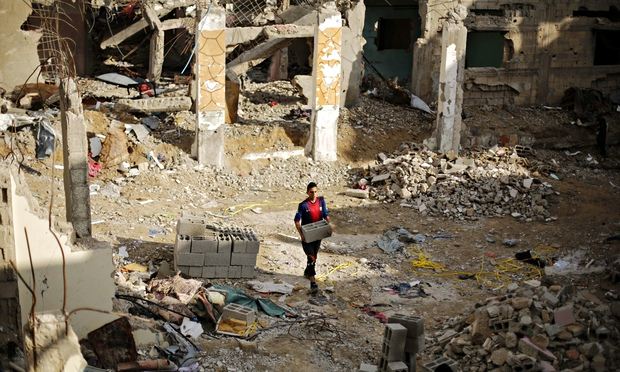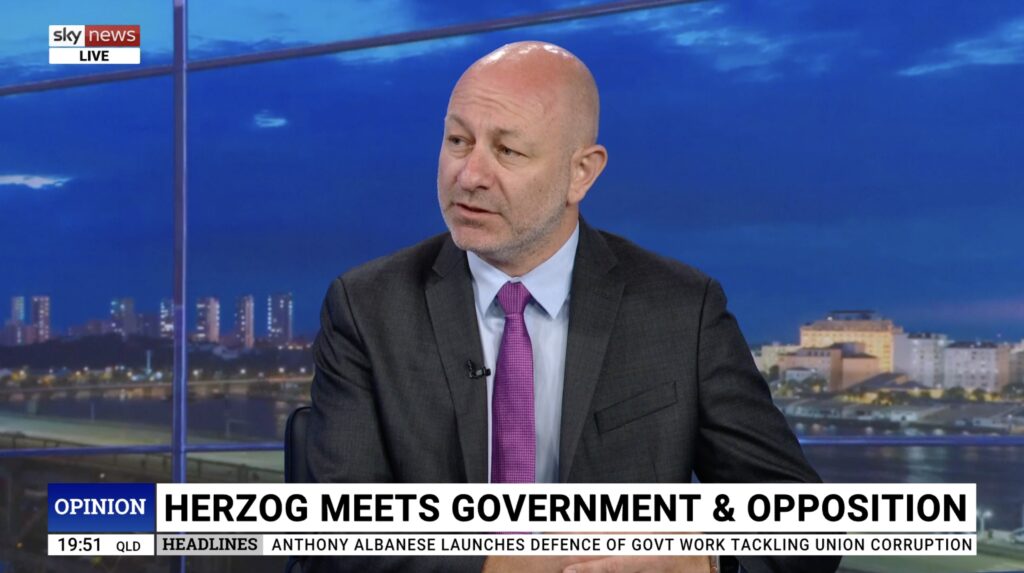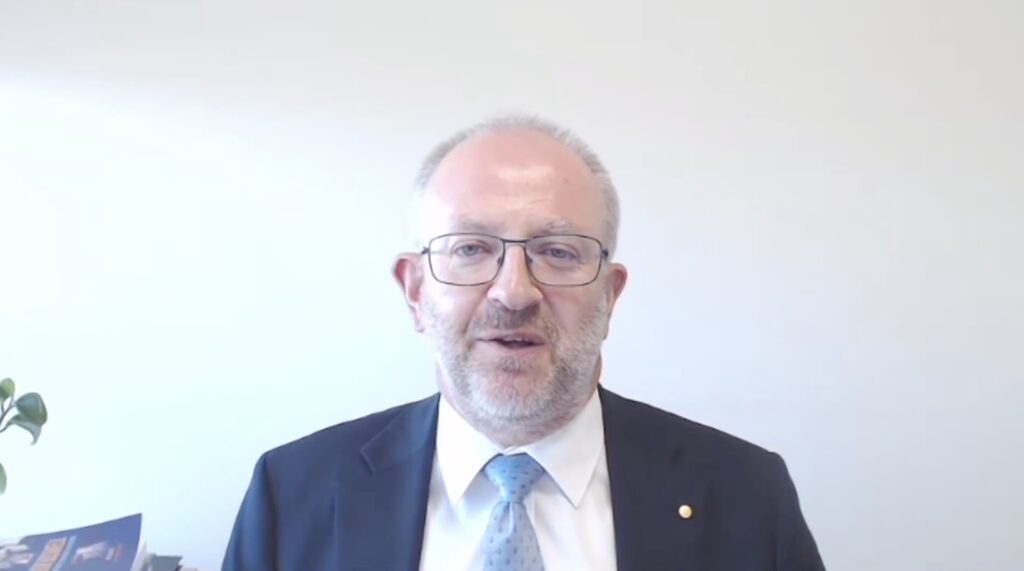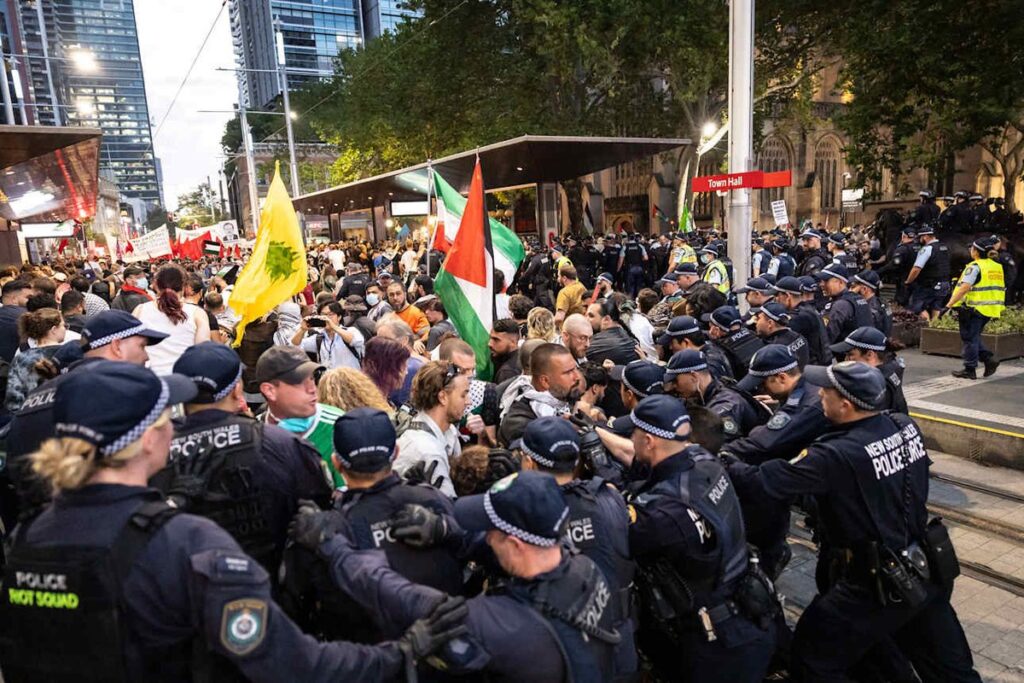UPDATES
More on the under-reported realities of Gaza’s stalled reconstruction
March 19, 2015 | Glen Falkenstein

European Union (EU) envoys met in early March with officials in both the Israeli foreign ministry and Palestinian Authority (PA) to advance Gaza reconstruction. The envoys reportedly indicated to the Israelis that positive moves had been made on their part to rebuild Gaza, and they also criticised the PA for its lack of progress and co-operation. A diplomat commented:
“There is positive movement on the Israeli side in everything regarding Gaza… the Israelis are removing hurdles and assisting reconstruction. At the same time, reconstruction is still stuck because of the internal fights on the Palestinian side, Egyptian behavior and failure to deliver funds pledged by the Arab states. We fear that if nothing will move on Gaza reconstruction, we will find ourselves facing another round of violence in Gaza.”
“[The EU Representatives] conveyed an unequivocal message that the PA can do more to promote reconstruction in the Strip, and that continued internal political squabbling between Fatah and Hamas are adversely affecting the humanitarian situation in Gaza and the pace and scope of reconstruction.”
Even the Secretary-General of the Arab League, Nabil El-Araby, has said much the same things, stating “internal differences and the absence of cooperation between the Palestinian Authority and Hamas are behind the delay in reconstructing the Gaza Strip.”
You would likely never know any of this if you read most of media coverage of the Gaza situation in Australia, where many reports have taken for granted that any delays in reconstruction and any humanitarian problems in Gaza are caused by Israel’s blockade (and only Israel’s blockade – Egypt’s much tighter controls on its border with Gaza are rarely mentioned).
Yet, envoys representing the five largest European Union members – Britain, Italy, Spain, Germany and France – countries that have previously been vocal in their criticism of Israel, are reportedly praising Israel’s efforts to address the humanitarian crisis in Gaza.
El-Araby and the EU envoys have squarely placed the blame for Gaza’s problems where it primarily belongs; on dysfunction on the part of the both the Palestinian Authority and Hamas governmental agencies, with the issue being compounded by the poisonous relationship between the two groups (as AIJAC’s Sharyn Mittelman recently documented in the Herald Sun.)
Israeli Ambassador to the UK Daniel Taub has also discussed what is really going on with the stalled Gaza reconstruction in the Guardian:
“Israel has cooperated fully with the trilateral Gaza Reconstruction Mechanism (GRM) established by the UN. To date under this arrangement it has facilitated the entry of over 62,000 tonnes of construction supplies to Gaza. This is corroborated by the Palestinian Authority’s own figures, which confirm that reconstruction is not being constrained by any lack of supply, and that stocks of all key materials, including cement, aggregate, and re-bar (steel), remain in surplus.”
“… the bulk of this commitment remains undelivered, as donors remain unconvinced that Hamas genuinely wants to rebuild Gaza’s homes, and not Gaza’s tunnels.”
“Under the GRM, agreed between the Palestinian Authority, the UN and Israel, the PA bears primary responsibility for coordinating reconstruction, leading both private sector and public sector works. A power struggle for control of the Gaza Strip between Hamas and the PA has degenerated into violence and recriminations, and taken precedence over the rebuilding effort.”
(For detailed information on what is going wrong with the Gaza reconstruction program, read Washington Institute scholar Neri Zilber’s piece from last month’s AIR.)
There are other reports about Israeli efforts to ameliorate the situation in Gaza which never make it into the Australian media. ‘Algemeiner and numerous Israeli papers have reported that Israeli officials have committed to doubling the amount of water provided to Gaza to ease water shortages there, in spite of threats from Hamas. Israel has also previously committed to supplying more water than it is legally obliged to under existing Israeli-Palestinian treaties:
“Coordination of Government Activities in the Territories (COGAT) chief Major General Yoav Mordechai said that Israel would increase water supplies from 1.3 to 2.6 billion gallons to help ease the ongoing water crisis in Gaza.”
“Mordechai added that he hopes Hamas ‘would not steal water from civilians as they steal construction materials intended for the reconstruction of houses.'”
Additional reports say that Israel is also easing restrictions on the export of fruit and vegetables from Gaza for humanitarian reasons – with existing exports to the West Bank facilitated by Israel now to be supplemented with exports directly to the Israeli market for the first time since the Hamas takeover of the territory in 2007:
“They (Israeli officials) said the measure was designed to help a Gaza economy devastated by last year’s war with Israel, and to make up for a shortfall in produce from Israeli farmlands left fallow during the current Jewish lunar calendar year in accordance with biblical law.”
“The move was welcomed by Jamal Abu al-Naja, director of the Gaza Vegetable Production and Export Association, who said he hoped it would help make up farmers losses and eventually encourage working farms to seek bank funding to expand their production.”
“Israel, which has been facing international calls to ease its blockade of Gaza, has been gradually relaxing restrictions on commerce across its fortified border since the July-August war which caused widespread destruction in the enclave.”
Meanwhile, other underreported news stories indicate that both the PA and Hamas are failing to improve the situation for the people of Gaza, and indeed, making it worse by neglecting to effectively collaborate on the delivery of essential resources to the Strip.
Reports indicate that Hamas has been openly boasting about rebuilding military training sites near Gaza’s borders in the north, east and west of the Strip – even as reconstruction of civilians homes for Gaza residents has stalled, according to the Palestinian news agency Ma’an:
“No sooner has the war come to an end, than the al-Qassam Brigades started a new stage of the conflict in preparation for the battle of liberation,” a report on the official website of the Izz al-Din al-Qassam Brigades said.
The report said that fighters from the group had rebuilt military training sites near the border in the north, east, and west of the Gaza Strip, giving lie to Israeli claims that ‘Operation Protective Edge’ in July-August 2014 had caused the group serious damage.”
Meanwhile, power has become even more intermittent in Gaza because the only power station has been shut down as the result of yet another Hamas-PA dispute about paying for the fuel to run it. To be clear, Israel has committed to facilitating the entry of fuel for the power station. This is not about the Israeli blockade; it is only about Hamas’ payments to the PA for the fuel it uses, and has hardly been reported in Australia:
“The Gaza Strip’s sole power plant has halted production, the Hamas-run energy authority said Thursday, following a dispute with the West Bank-based Palestinian Authority over fuel tax.
Hamas pays the PA for fuel imported to besieged Gaza, but is short of cash and had been unable to cover the additional costs in tax.
In December, Qatar stepped in and donated $10 million to the PA to cover the tax, effectively exempting Hamas from paying it.
But that money has dried up, and the PA is insisting Hamas begin paying the tax again, the Islamist movement says.
“The power plant stopped producing electricity during the night, after funds from Qatari donations to cover fuel costs ran out,” the Hamas-run Gaza energy authority said.
“We are unable to pay for the fuel because of the taxes on purchasing it.”
There is no doubt the people of Gaza require humanitarian assistance and that the reconstruction from last year’s war is proceeding very slowly. The UN put in place a program, and solicited apparently ample donations that should have led to the problem being addressed. Reading most of the Australian media, which often seems uninterested in reporting from the Israeli-Palestinian theatre unless the story fits a particular narrative, one may never understand the real reasons why.
Funds, resources and aid must be allocated and delivered to benefit the welfare of the people of Gaza, the reasons for the ineffective delivery of which has not been widely reported. It is incumbent upon the Palestinian Authority and those in control of Gaza to work constructively with the UN, the international community and states contributing to the reconstruction effort to ease the humanitarian crisis. It is also incumbent upon the international media to accurately report the real roots of the problem so that governments and agencies can act effectively to resolve them.
Glen Falkenstein
Tags: Israel





